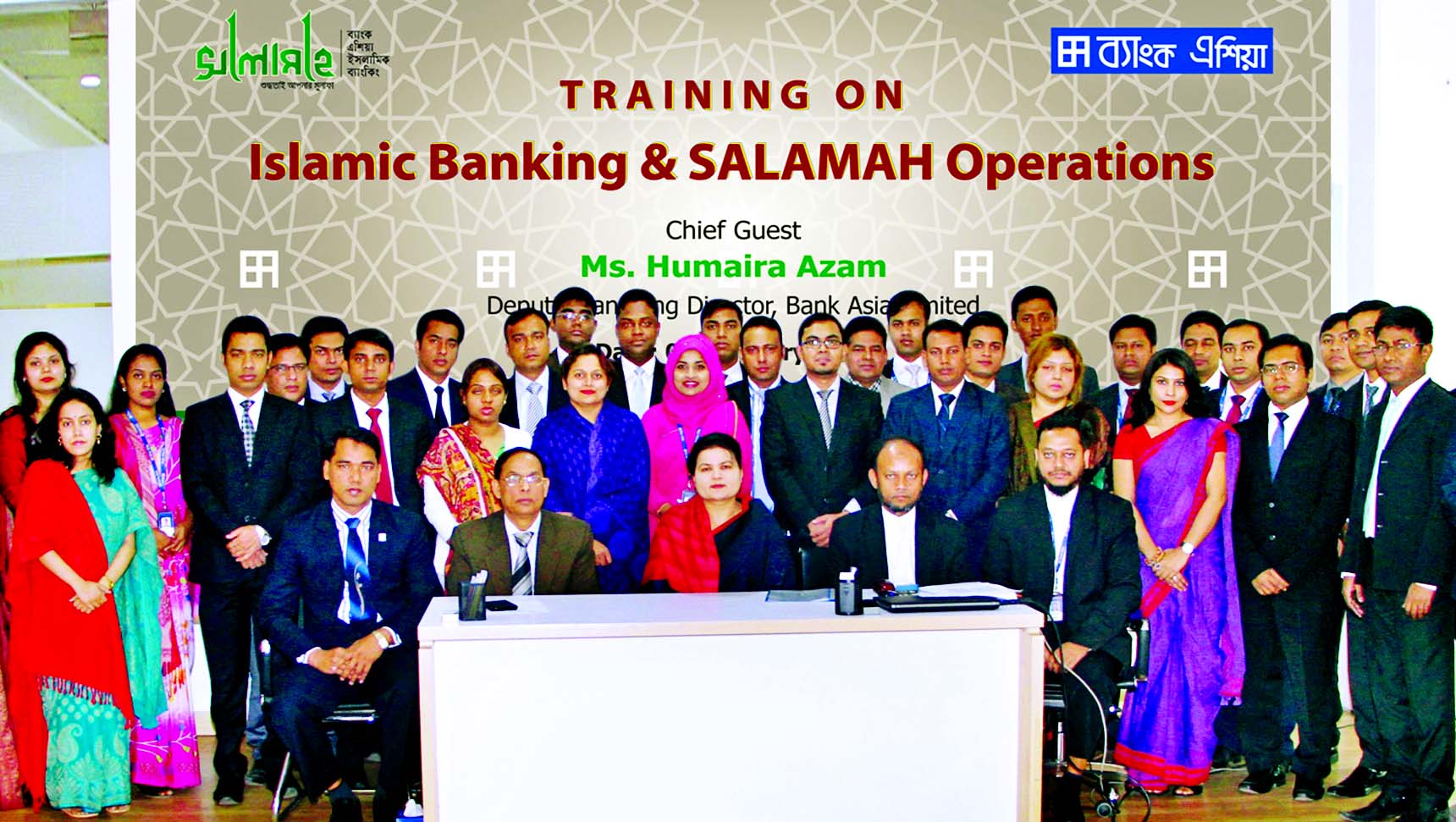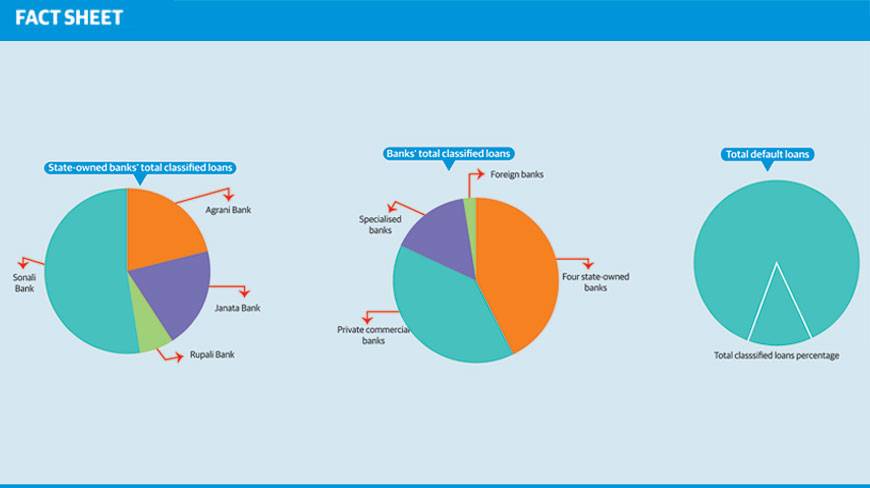Finance
Humaira Azam, Deputy Managing Director of Bank Asia Ltd poses with the participants of a day-long training program on 'Islamic Banking and Salamah Operations' for its 38 officers at its training institute, Tejgaon, Dhaka on Saturday. Head of Training & Vi

Humaira Azam, Deputy Managing Director of Bank Asia Ltd poses with the participants of a day-long training program on \'Islamic Banking and Salamah Operations\' for its 38 officers at its training institute, Tejgaon, Dhaka on Saturday. Head of Training &
Stable banking sector capable of tackling any risk: BB
The country's banking sector is stable and capable of tackling any risk, according to a Bangladesh Bank document, which attributes strong capital adequacy and sufficient liquidity to the banks' strength, reports BSS. Constant internal and external monitoring, upgrading loan classification and provisioning to the global standard and ensuring good governance in the board of directors have also contribute to the higher resilience and the strength of the banking sector, the document said.
According to the BB, the risk-weighted capital adequacy ratio, which is one of the major indicators of the banks' health, stood at 11.35 per cent at the end of December when the amount of reserve capital in banking sector rose to Taka 71 thousand 754 crore.
"The higher capital adequacy ratio and reserve capital boosted the bank's resilience to risks," BB said.
It said the loan classification and provisioning also upgraded to the international standard, with limiting the time for loan classification and making minimum capital requirement (MCR) mandatory for all banks.
The central bank said the profit before tax and provisioning in the banking sector also rose to Taka 21 thousand 265 crore in 2014 from the previous year's Taka 18 thousand 610 crore.
The document showed that liquidity in banks was Taka 3 thousand 364 crore, which was usual for the country's banking sector, having 56 banks in operations.
"The adequate liquidity helps maintain stability in the call money market where the interest rate remains around 7.0 percent for long," BB said.
The credit growth also marked 13.99 percent rise in 2014 when banks disbursed Taka 5 lakh 28 thousand 755 crore compared to Taka 4 lakh 63 thousand 871 crore only to the individual borrowers, indicating dynamism of economy.
BB said the banks also disbursed loans to export oriented industries from the Export Development Fund (EDF) at only 2.0 percent rate of interest to help accelerate the country's export earnings.
BB injects more funds into scheme for slum dwellers
The repayment rate under the “Ghore Phera” programme for slum dwellers has been very high, a development which prompted the central bank yesterday to put another Tk 2 crore into the scheme.
Introduced in 1999 by the Krishi Bank with the aim to rehabilitate slum dwellers back to their native villages, the programme has so far seen recovery rates of 87 percent, according to Md Abdus Salam, the bank's managing director.
The loan carries a 6 percent simple interest payable in 10 years in 120 instalments.
So far, 970 individuals have been rehabilitated in their own villages, he said, adding that 30 percent of them later returned to cities in search of employment.
At an agreement-signing programme yesterday at the Bangladesh Bank headquarters, Atiur Rahman, governor of the central bank, said more funds would be made available for the scheme.
Thanks to the fund injection, the guideline of the loan programme has been changed and the ceiling upped, Salam said. Earlier, a person could take a maximum loan of Tk 50,000 but now the ceiling will be raised to Tk 1 lakh.
Other ceilings too have been increased. For example, for house building a person can now take out a maximum loan of Tk 50,000 loan instead of Tk 7,000 as before.
Besides, ceilings of almost all loan programmes aimed at income-generating activities have been doubled, the Krishi Bank MD said.
Krishi Bank has so far disbursed Tk 4 crore loans under the programme, of which Tk 2.50 crore remains outstanding.
News:The Daily Star/8-Sep-2014
SME loan target up by 19.63pc
Bangladesh bank (BB) has set the target for disbursement of Small and Medium Enterprises (SMEs) loan at Tk 887.53 billion for the year 2014. The amount is 19.63 per cent higher than the last year’s target of Tk 741.87 billion. According to sources, the scheduled banks and financial institutions disbursed a total of Tk 853.23 billion in last year (2013) among 0.744 million SME entrepreneurs across the country. The SME loan disbursed in 2013 was also16 per cent higher than the target set for the year. Out of the total disbursements, women entrepreneurs received Tk 33.46 billion under the SME financing. Of the amount Tk 654.72 billion crore was distributed in urban area while Tk 198.50 billion in rural area. The authorities could achieve their target in disbursement of SME loans because of due policy supports from the central bank like rescheduling facilities and low interest rates, said SME Programme Department general manager Masum Patwary.
“BB always encourages commercial banks and the financial institutions to supply adequate loan to SME entrepreneurs to promote the Small and Medium scale industries,” said the general manager. BB is planning to implement some effective initiatives for further expansion of SMEs across the country such as start up financing, credit guarantee scheme, venture capital financing, SME deposit product, cluster mapping, SME product marketing and web based marketing, non financial services and incubation centre.
In Bangladesh, 90 per cent private sector enterprises are SMEs. Around 25 per cent of the country’s total labour force are working in the SME sector and contributes about 40per cent of gross manufacturing output, the general manager also added.
Banks in Bangladesh are being supported in SME financing initiatives at subsidised interest rate with refinance facilities from Bangladesh Bank, which is being funded by the central bank, government of Bangladesh and development partners like IDA, ADB and JICA.
The SME loan disbursement has increased in recent days as the central bank is continuously encouraging new entrepreneurs to take SME loans from banks and financial institutions, said M Mafuzur Rahman, executive director of the central bank.
“The development of SMEs can reduce economic disparity from society and help the country to create more employment opportunity. So we need to expand SME loan allocation across the country for the betterment of the economy,” also said the executive director.
News:Daily Sun/08-Feb-2014
Race to be delisted as loan defaulters

Jebun Nesa Alo
The loan defaulters are making serious efforts to reschedule their accounts so they do not disqualify for participating in the upcoming general election, said Bangladesh Bank sources.
As per the amended Representation of the People Order (RPO), the aspirants of the parliamentary election require clearance of default loans and outstanding utility bills.
Meanwhile, Bangladesh Bank governor Dr Atiur Rahman recently instructed the Credit Information Bureau (CIB) of the central bank to prepare related data.
A senior official of CIB told Dhaka Tribune that they are “ready logistically to provide information on loan defaults by the announcement of election schedule.”
Bangladesh Bank has seen an increase in applications for loan rescheduling recently from both the state-owned and private commercial banks, said a central bank official.
“We are following regulation in approving applications,” he added.
The banks also utilised the chance of loan rescheduling before election to recover their classified loans by receiving down-payments.
“Defaulters can regularise their loans either for short time or long time if they want to take part in the election. It is a great chance for banks to recover classified loans,” said Nurul Amin, managing director of National Credit and Commerce Bank Ltd.
“It will help reduce burden of nonperforming loans in the balance sheet.”
He said they have received many applications for rescheduling big loans for past few days particularly from business people.
However, there were no such applications that used political influence, added Nurul Amin.
Echoing with the NCC Bank MD, Pubali Bank MD Helal Ahmed Chowdhury said: “Many politicians are negotiating with us to reschedule their loans.
But it’s a great opportunity for us to recover classified loans.”
According to a Bangladesh Bank circular, no default loan can be rescheduled more than three times.
The first time rescheduling is done on payment of at least 15% of overdue instalments or 10% of total default amount, whichever is lower.
In the second rescheduling, at least 30% of overdue or 20% of total default loan – whichever is lower – will have to be paid.
The third rescheduling requires payment of at least 50% of overdue instalment or 30% of the total default loan – whichever is lower.
The classified loans rose 8% to Tk567bn in the July-September period quarter from Tk523bn of the previous three months, said Bangladesh Bank data.
The classified loans are about 13% of total default loans which amount to over Tk4tn.
Of the total classified loans, four state-owned banks have Tk241bn, private commercial banks Tk223bn, specialised banks Tk87bn and foreign banks Tk14bn.
Of the state-owned banks, Agrani Bank’s classified loan stood at Tk51bn, Janata Bank Tk47bn, Rupali Bank Tk16bn and Sonali Bank Tk125bn.
News:Dhaka Tribune/24-Nov-2013



